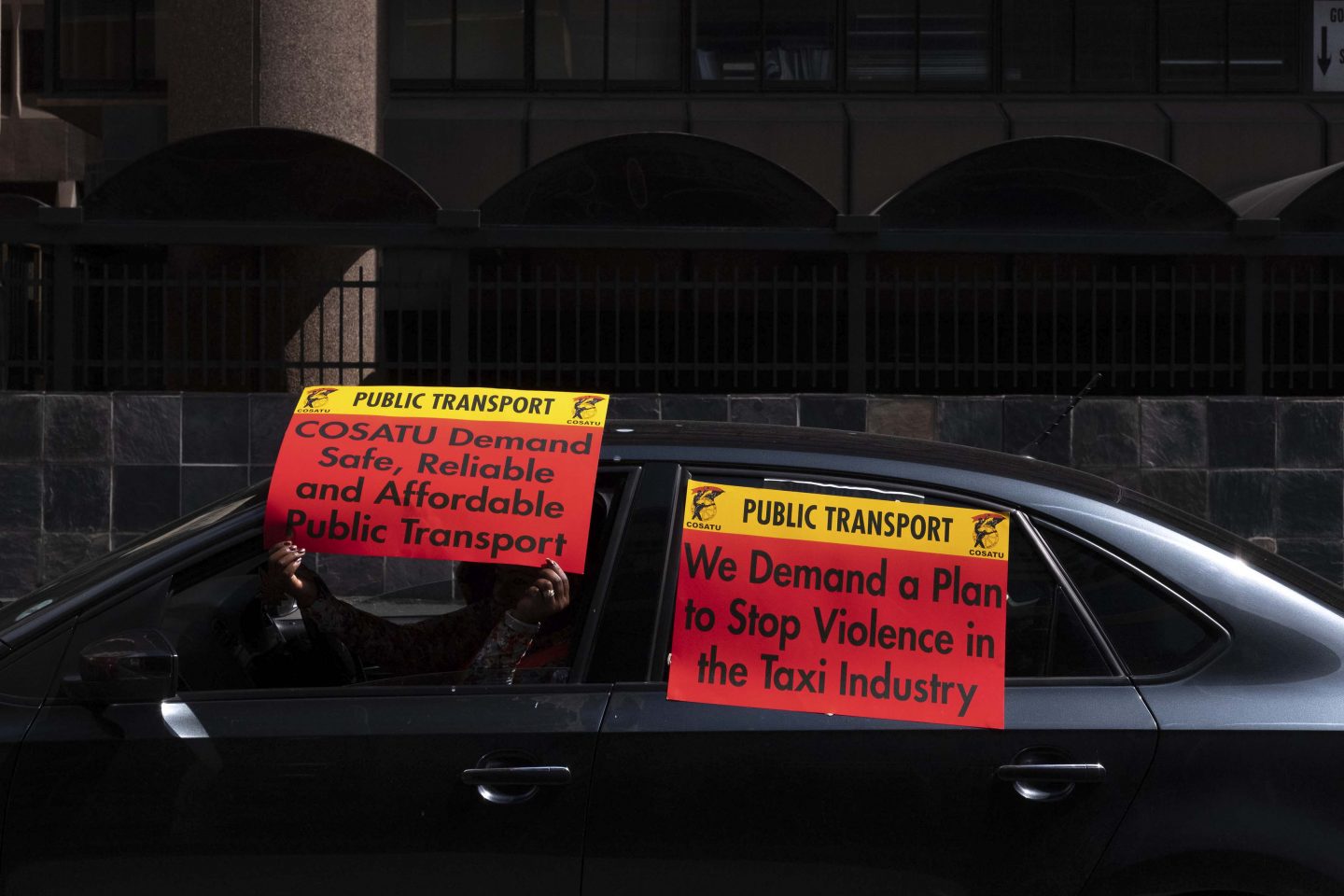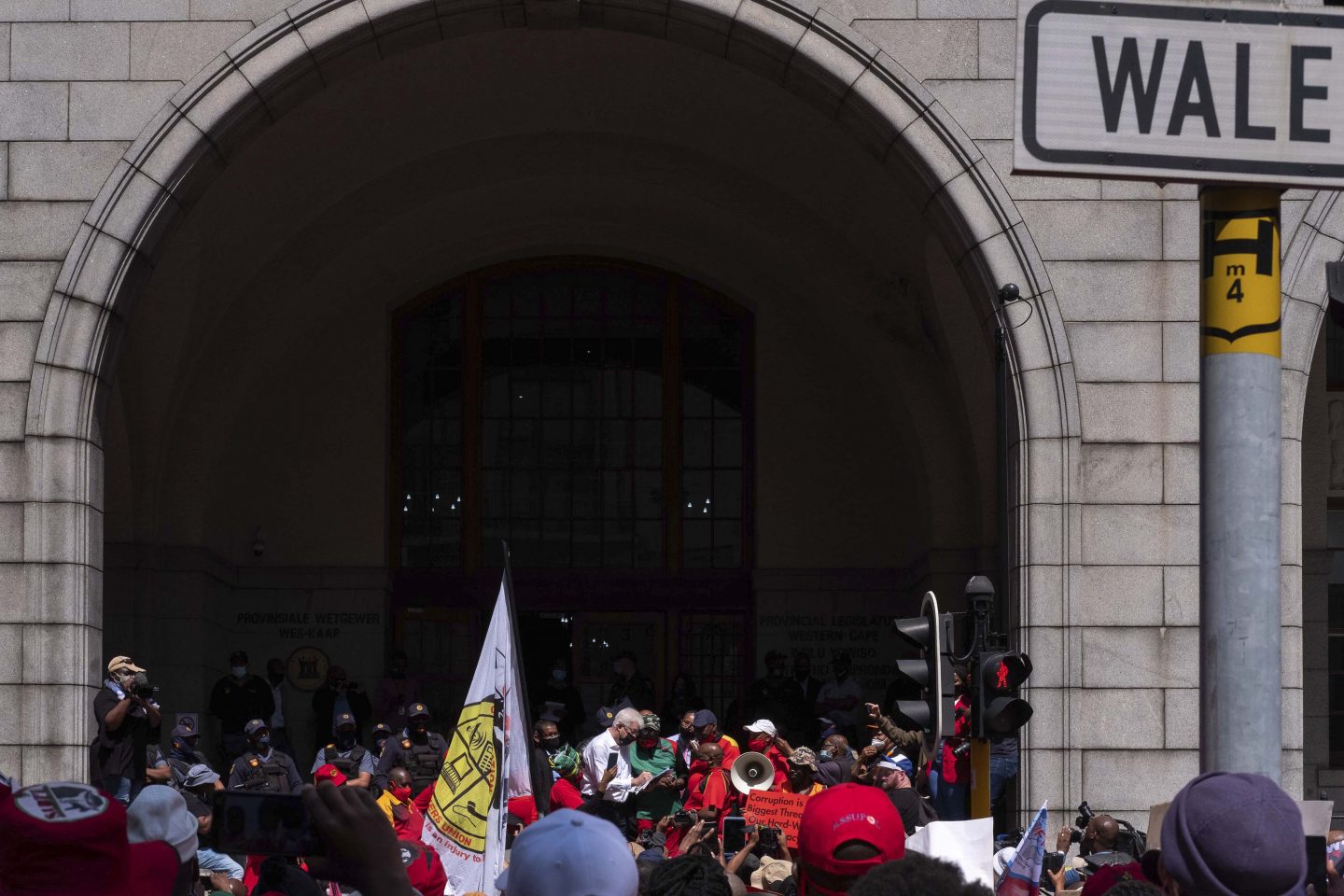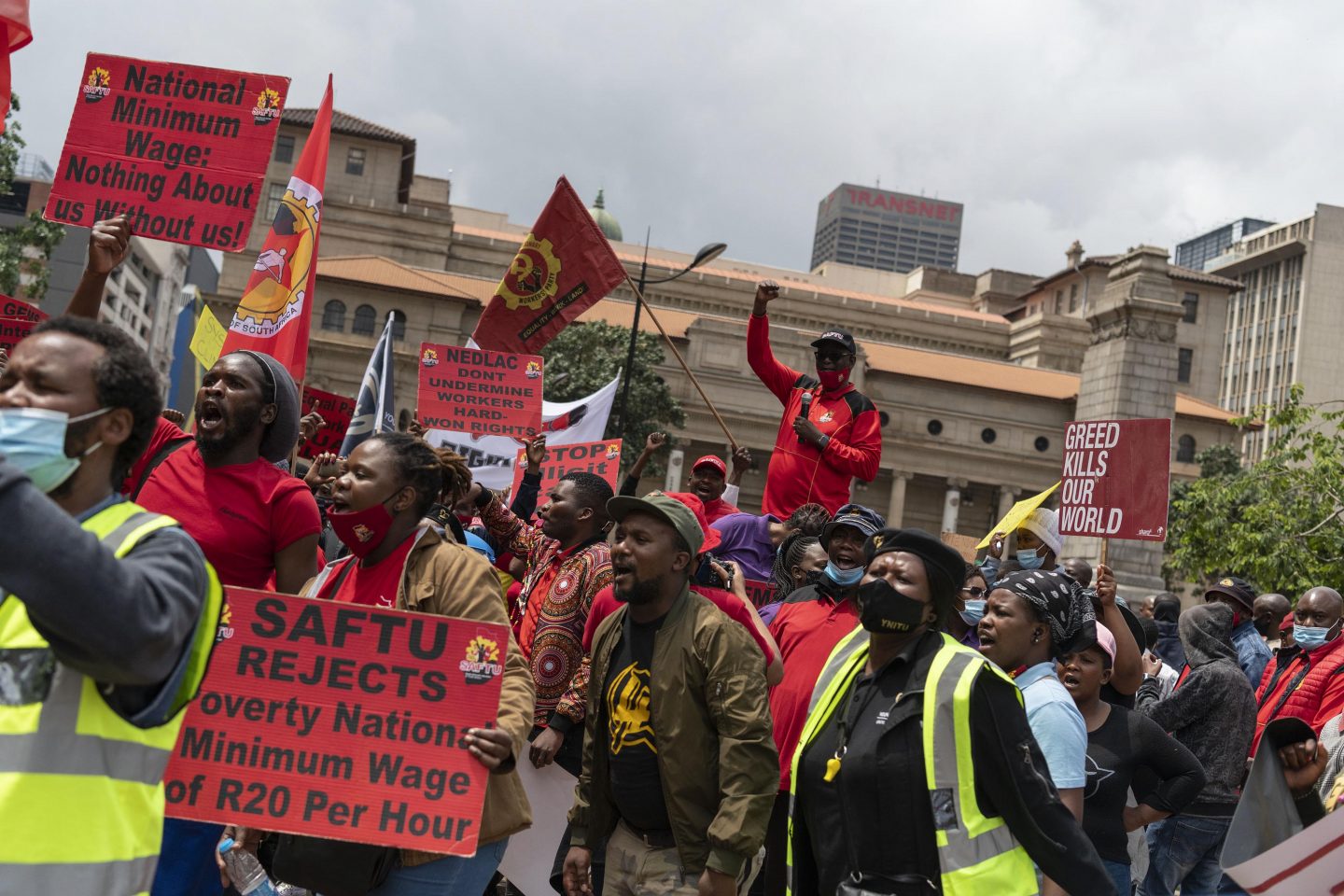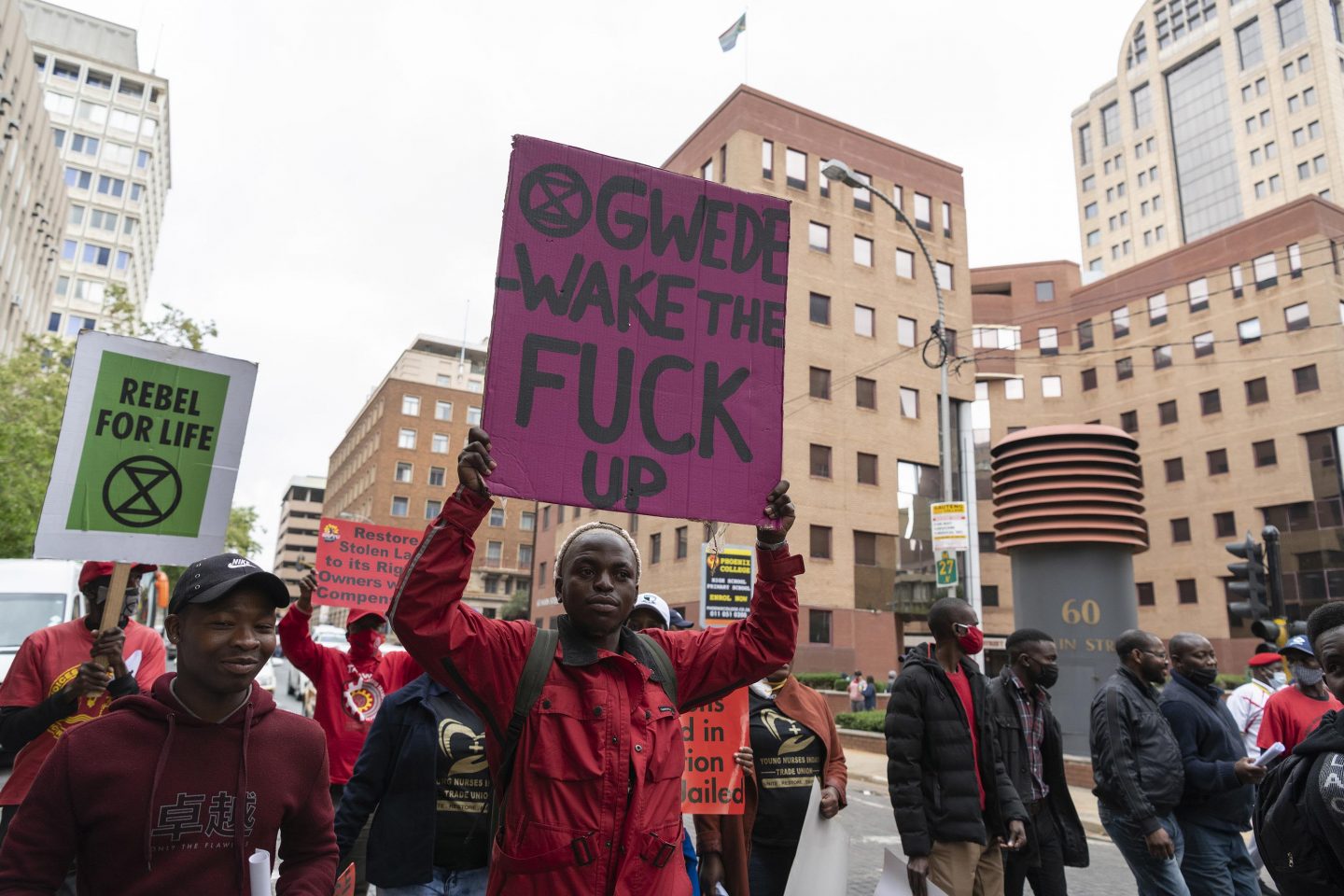Together, unions put the government on notice
Four federations joined hands for the first time ever to raise a number of problems faced by both workers and the unemployed, as well as pressing social issues the government has not addressed.
Author:
8 October 2020
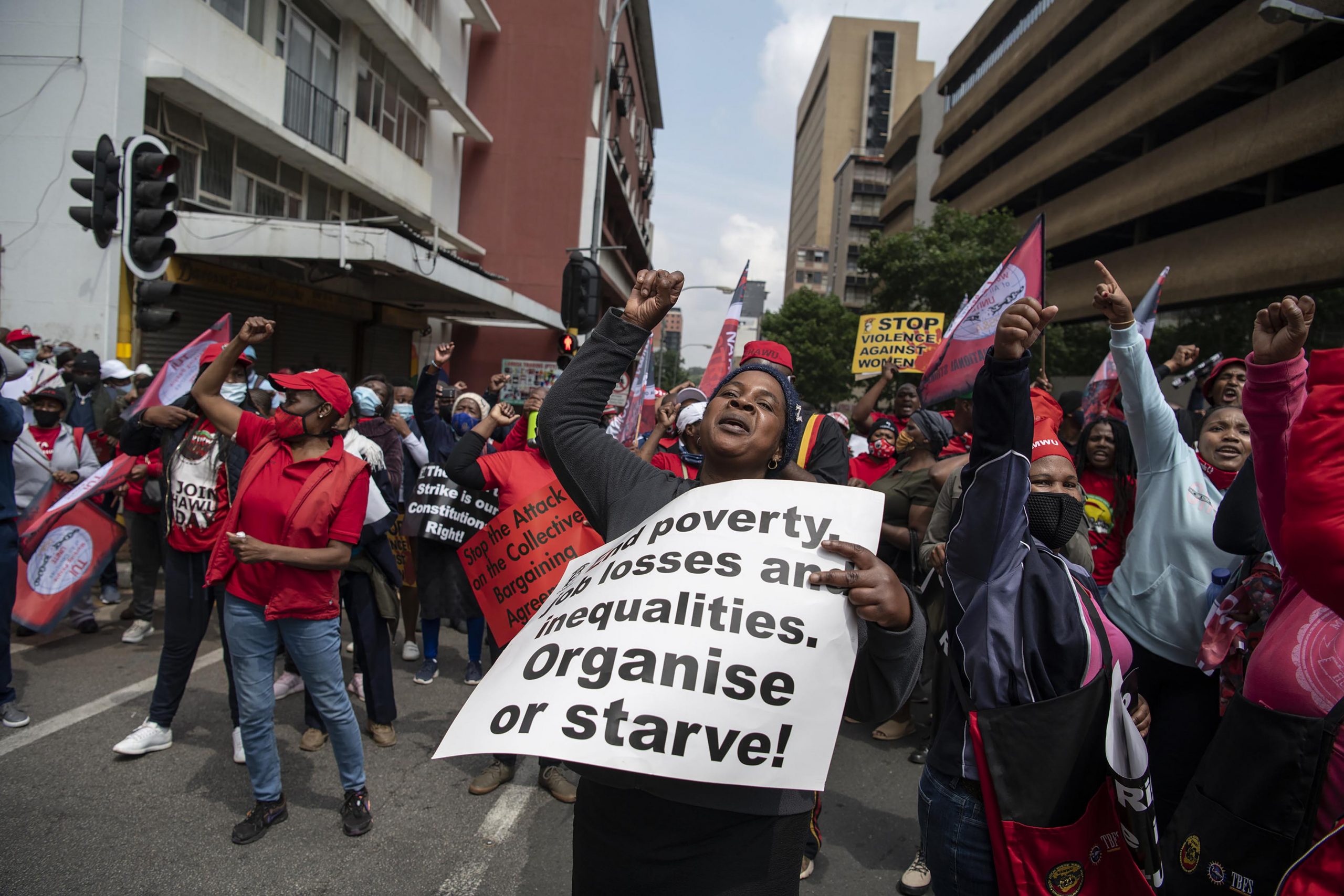
Fuelled by nearly three million jobs lost during the Covid-19 lockdown, four union federations held an unprecedented strike on Wednesday 7 October to protest against mass dismissals, the collapse of public transport, casual employment, corruption, gender-based violence, the government’s threat to freeze the wages of public servants and the looming water crisis.
For the first time in their history, the Congress of South African Trade Unions (Cosatu), the South African Federation of Trade Unions (Saftu), the Federation of Unions of South Africa (Fedusa) and the National Council of Trade Unions (Nactu) joined forces to protest against several aspects of the austerity programme introduced by President Cyril Ramaphosa’s government since the coronavirus pandemic. Because of Covid-19, numbers were limited to 500 people per demonstration.
“We can no longer live in a country with so much riches, and yet we are property-less and landless. We can no longer just watch the looters continue to rape billions and billions of rands. We are not going to stand idle when the future of our children is at stake,” said Saftu general secretary Zwelinzima Vavi.
Related article:
The Cell C head office in Johannesburg was specifically chosen after the company announced recently that it would retrench more than 1 600 of its 2 500 workers. “We are targeting Cell C only as a symbol to highlight the fact that between March and June this year, the economy shed 2.2 million workers who have now joined the long queue of the unemployed. We now have 14 million able-bodied South Africans who are looking for employment opportunities but who cannot find them. In the future, we will target all the other companies who are offloading workers,” said Vavi.
The union federations also demanded a moratorium on all retrenchments in the private and public sector and that all casual workers in the public sector, including community health workers, early-childhood education workers and public works employees be given permanent employment. Another key demand was for public sector workers to be paid the wage increases already promised under the current collective agreement.
“Government will not be allowed to sign agreements with public sector workers and then willy-nilly refuse to implement agreements. The doctors, the nurses, the administrators that are helping us at [the Department of] Home Affairs must now wait until after 2024 before they see any kind of increases in the public service, and we are saying no to that,” said Vavi.

Cosatu general secretary Bheki Ntshalintshali said: “Acts of sustained civil disobedience are paramount at this time, because sitting down and doing nothing will mean that we accept the death sentence that is handed to us by the political and business power structure who are mismanaging the economy and attacking workers’ rights.” He added that Cosatu also wants labour to be recognised for its massive contribution to keeping the economy afloat during the Covid-19 pandemic, instead of being subjected to austerity measures by the National Treasury.
“The failure of the public transport system during the lockdown is a reminder of how little we have achieved without the majority of our people having access to reliable, affordable, integrated and safe public transport. It is impossible to fix the serious economic challenges without dealing with the major problem of public transport,” Ntshalintshali added.
Western Cape: ‘We are in solidarity’
Reporting by: Barry Christianson
Cape Town’s leg of the protest was relatively small with what seemed to be a maximum of 300 people present. Beginning in Langa, a motorcade made its way into the city via the N2 to its first stop, the Cape Town Civic Centre, where a memorandum was handed over to mayor Dan Plato. The next stop was to hand over a memorandum to premier Alan Winde at the Western Cape provincial legislature, and the last one to do the same at the office of the speaker at Parliament.

Protesters wore red T-shirts bearing slogans such as “Public Servants United in Defence of Their Collective Bargaining Rights” and “Public Servants United in Fighting Gender-based Violence”. Some of the protesters marched while others drove in a motorcade of taxis that slowly made its way through the city streets. The crowd was made up of a diverse array of people ranging from union officials to frontline workers and unemployed people.
Eleanor Roberts, the Western Cape provincial chairperson of the Democratic Nursing Organisation of South Africa (Denosa), joined the protest to show support for workers in general, but also in her capacity as a professional nurse. According to Roberts, the three-year collective agreement with the government included annual salary increments of which only the first two years were honoured. “Suddenly the government is saying they don’t have money to pay our salary increments,” said Roberts. “We are in solidarity here as nurses too … During Covid-19 we were there as the frontliners, and we are concerned about the nurses who did not receive their risk allowance.”
Thali Mfundisi, a contract worker in the community education and training sector since 2011, is employed by the Department of Higher Education and Training. “We are here because they have agreed to make us permanent. Every year they renew our contract and this year they are not even using a contract. They are using the extension letters that don’t have the proper details for a government employee … For us, it means that we mean nothing for the department, even though we are working very hard to develop our communities,” said Mfundisi.
Others like Nomthandazo Sharon Coba, a resident from Langa, joined the protest in the hope that they would be able to add to the critical mass required to successfully bargain for the expanded public works programme to do away with short-term contracts in favour of employing workers permanently. Coba worked as a cleaner on such a contract about two years ago but has been unemployed ever since. These days she lives on the money she makes doing informal work. The back of her T-shirt bore the words “Anti-exploitation”, which was a theme that connected the calls for the salary increments promised in the collective bargaining agreement, the call to end corruption, as well as an end to the short-term contracts of the expanded public works programme.
Eastern Cape: An unresponsive government
Reporting by: Anna Majavu and Bonile Bam
In the Eastern Cape, about 300 workers from Cosatu and Saftu protested together outside premier Oscar Mabuyane’s office in Bisho. However, he failed to come outside to meet them and receive their memorandum.
In Port Elizabeth, a march on the city hall was held by hundreds of workers from the South African Emergency Personnel Union, the South African Clothing and Textile Workers Union, Denosa, National Union of Mineworkers, the National Education, Health and Allied Workers Union (Nehawu), National Public Service and Allied Workers Union (Nupsaw) and Young Nurses Indaba Trade Union, as well as others.
Simphiwe Magadaza, 49, a member of Sadtu from Motherwell in Port Elizabeth, said he was marching because he wants the government to listen to grievances and respond. “There is a lot going on in South Africa currently and people are losing their jobs, and yet our leaders are involved in corruption. And there is gender-based violence, so we want the government to explain to us what exactly is going on.”

Pakama Mapothi, 33, a Nehawu member from KwaDwesi, said she was striking because the government has refused to pay this year’s wage increase to public servants, which had been guaranteed under the three-year collective agreement.
“We have got a problem with the government. To date, the government has not given public servants their increment. The people from the health sector are frontline workers and are not getting proper PPE [personal protective equipment]. So our members are dying because of this Covid-19 and our government has not taken care of them,” Mapothi said.
Thandokazi Mbombo, the regional secretary of Nupsaw, is also a general worker at Livingstone public hospital. She says the working conditions in the public sector are “terrible”. “It is for this reason that we decided to join other unions to demonstrate to the government that we are being undermined. As women, we are being abused, raped and killed by our partners. We are fighting a painful struggle in South Africa.”

Gauteng: ‘Show some appreciation’
Reporting by: Ihsaan Haffejee
In Johannesburg, hundreds of union members gathered outside Cosatu House, the trade union federation’s headquarters. Among those taking part in the demonstration was Jessica Mathebula, a member of Denosa. She said the union is demanding that the government pay a risk allowance for healthcare workers like nurses, who have to face the virus on the front lines.
“Lots of nurses have been infected with Covid-19, and the pandemic has also been psychologically draining on frontline healthcare workers. That is why we are demanding the risk allowance for these workers,” said Mathebula. “These are the workers who have taken big risks in helping South Africa reduce the numbers of infections, and the government should show some appreciation.”
Waving placards and singing songs, workers then made their way through the Johannesburg central business district. They could be seen urging others to join in the strike action as they moved towards the office of the Minerals Council South Africa in Marshalltown to hand over their memorandum.
At Beyers Naudé Square, members of Saftu had gathered to show their support for the national strike. Vavi addressed the crowd before they were to make their way to Gauteng premier David Makhura’s office to hand over a memorandum of demands. “Comrades, all of you are citizens of this country, and all of you can see that our future is being stolen right in front of our eyes,” said Vavi. “There are issues that affect all workers in South Africa. That is why we don’t mind marching alongside Cosatu – so that we can together highlight the plight of workers in South Africa.”
Chanting “the workers united will never be defeated”, union members continued their march through the centre of Johannesburg.
Sibusiso Nkosi, a member of Sadtu, reiterated that the government should not take the workers’ vote for granted. “We voted for this government in the past, but our vote is not guaranteed in the future, especially if these austerity measures that are severely impacting workers continue,” said Nkosi.
KwaZulu-Natal: Targeting private and public sectors
Reporting by: Nomfundo Xolo
In Durban, Cosatu members held a motorcade protest from Curries Fountain to the Durban Central police station, where they delivered a memorandum against corruption, retrenchments, gender-based violence and attacks on collective bargaining.
“We made a decision to hold a motorcade protest because we can no longer continue to watch the public sector crumble through corruption and false promises,” said Thami Mzibeni, provincial secretary of the Communication Workers Union.

Mzibeni attributed the strike to the “terrible” working conditions of workers, a lack of service delivery and corruption, among other things. He pointed out that workers in the public sector have been vulnerable because of exposure to Covid-19, for which they did not receive PPE.
He also blamed the private sector for playing a part in the worsening of workers’ working conditions. “Workers are overworked and underpaid, and the private sector refuses to enter into bargaining processes to ensure a dignified living minimum wage,” he said.
To substantiate his claims, Mzibeni picked the South African Post Office as a prime example of how corruption has manifested and left workers disgruntled. He pointed out that the post office was given a R1.5 billion bailout. Instead of making workers permanent, executives received raises and were paid bigger packages.
“Temporary workers are still working in the same conditions. They are demanding that [the post office] should not be given another bailout. So, this is why they are protesting – they want to address why our government is doing this and they want to show their power,” he said.
Related article:
The workers are also demanding a fair opportunity to fill all vacant positions in the public sector. They also called for the Public Service Commission’s integrity committee to deal objectively with every case of corruption. They want Telkom chief executive Sipho Maseko to be removed because 3 000 workers have been retrenched.
One of the protesters, who has been working for Makro for the past 20 years, was very angry and had a loud and clear message for big corporations, who she said are exploiting people. “Down with America, Walmart and Massmart! They are taking away our human rights!” said the disgruntled worker, who preferred not to be named.
“They use labour brokers and only offer you three-month contracts, of which the brokers will be receiving a huge percentage of your salaries.”
The strike was the beginning of a programme of rolling mass action. The next protest will be on 12 October, when the four union federations will march to the Union Buildings in Pretoria, followed by another on 2 December. In March 2021, said Vavi, “we are joining with civil society, the taxi associations and the truck driver associations. Be they on the farms, or facing eviction in the townships, we will unite the workers and the unemployed workers. We will shut down the economy totally to demand not some changes on the periphery, but that the economy be overhauled completely.”



